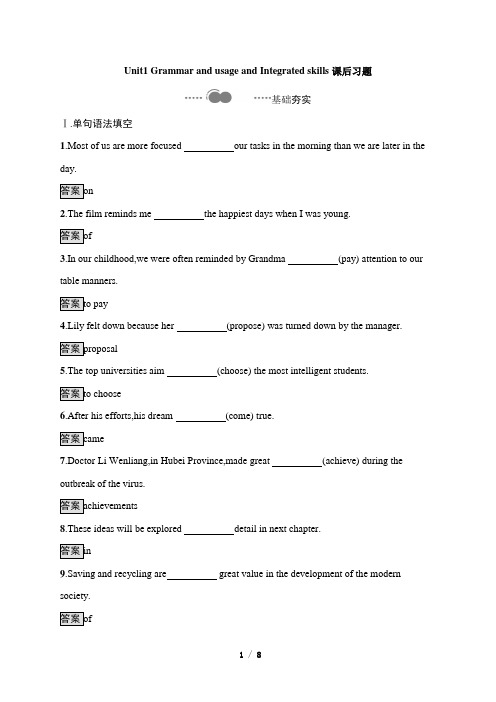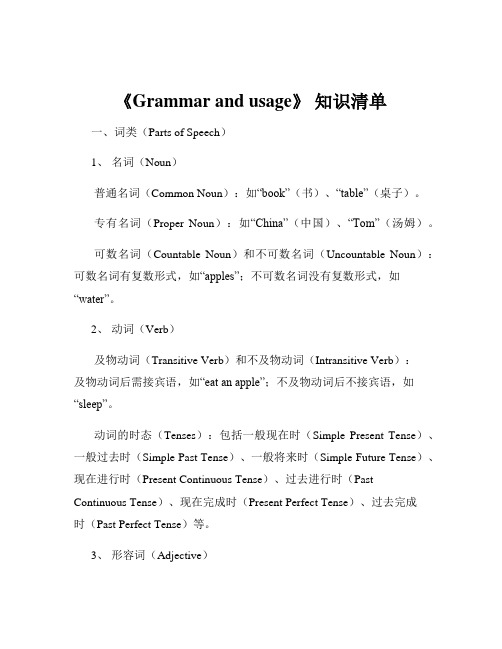Book 6_U1_Grammar and usage
- 格式:ppt
- 大小:954.50 KB
- 文档页数:16

Unit 1 Nature in the balanceGrammar and usage (II)Ellipsis◆内容分析:本板块围绕单元话题,以“环保纪录片和环境志愿者活动”创设情境,引导学生在谈论关于环境保护的纪录片的对话中观察、探究省略这一语法现象,并自主归纳其核心语法规则;接着通过单句和语篇两个层面的练习巩固所学、内化新知;最后要求学生正确运用省略这一语法规则创作几条环保宣传语。
◆教学目标:By the end of this section, students will be able to:1.learn about the functions of ellipsis;2.summarize the general rules of ellipsis;3.apply the rules of ellipsis in the context.◆教学重难点:1.To summarize the general rules;2.To apply the rules correctly and properly.◆教学过程:Step 1 Review—Homework checking1. —Have you seen this film?—Yes, I have seen it.2. —Will the performance be put off till next week?—I hope it will not be put off till next week.3. The emperor cannot break his promise, although he would like to break his promise.4. You can watch the documentary or you can watch the feature film.5. The opera house looks grander now than it did when I visited it last year.6. In the Amazon rainforest, you can see many plants known to us and you can see thousands of animals.7. When she was alone, she often felt anxious and uncomfortable.8. I want to do something to help protect endangered animals, but I don't know how to help protect them.9. The boy could not go out to play basketball, even though he wanted to go out to play basketball.10. I like dancing more than I like singing.Suggested answers:1. —Have you seen this film?—Yes, I have (seen it).2. —Will the performance be put off till next week?—I hope (it will) not (be put off till next week).3. The emperor cannot break his promise, although he would like to (break his promise).4. You can watch the documentary or (you can watch) the feature film.5. The opera house looks grander now than (it did) when I visited it last year.6. In the Amazon rainforest, you can see many plants known to us and (you can see) thousands of animals.7. When (she was) alone, she often felt anxious and uncomfortable.8. I want to do something to help protect endangered animals, but I don't know how (to help protect them).9. The boy could not go out to play basketball, even though he wanted to (go out to play basketball).10. I like dancing more than (I like) singing.【设计意图:复习巩固。

Unit1 Grammar and usage and Integrated skills 课后习题基础夯实Ⅰ.单句语法填空1.Most of us are more focused our tasks in the morning than we are later in the day.2.The film reminds me the happiest days when I was young.3.In our childhood,we were often reminded by Grandma (pay) attention to our table manners.4.Lily felt down because her (propose) was turned down by the manager.5.The top universities aim (choose) the most intelligent students.6.After his efforts,his dream (come) true.7.Doctor Li Wenliang,in Hubei Province,made great (achieve) during the outbreak of the virus.8.These ideas will be explored detail in next chapter.9.Saving and recycling are great value in the development of the modern society.10.If you follow me,you will make greater (succeed).11.(profession)spent more time on the research.12.They asked me to design a (post) for the activity.Ⅱ.短语填空1. the heavy rain,the football match was put off.2.After his retirement,he can his personal interests.3.Whatever happens,we’ll our promise.4.His dream of becoming a university teacher has .5.You’ll be able to choose a room your own personal taste.6.Even if the child’s access to schooling is difficult,you should not .7.To our satisfaction,his efforts on his children will .8.We to be there around six.Ⅲ.完成句子1.他们成功地克服了各种困难。



《Grammar and usage》知识清单一、词类(Parts of Speech)1、名词(Noun)普通名词(Common Noun):如“book”(书)、“table”(桌子)。
专有名词(Proper Noun):如“China”(中国)、“Tom”(汤姆)。
可数名词(Countable Noun)和不可数名词(Uncountable Noun):可数名词有复数形式,如“apples”;不可数名词没有复数形式,如“water”。
2、动词(Verb)及物动词(Transitive Verb)和不及物动词(Intransitive Verb):及物动词后需接宾语,如“eat an apple”;不及物动词后不接宾语,如“sleep”。
动词的时态(Tenses):包括一般现在时(Simple Present Tense)、一般过去时(Simple Past Tense)、一般将来时(Simple Future Tense)、现在进行时(Present Continuous Tense)、过去进行时(Past Continuous Tense)、现在完成时(Present Perfect Tense)、过去完成时(Past Perfect Tense)等。
3、形容词(Adjective)形容词用于描述或修饰名词,如“beautiful girl”(漂亮的女孩)。
形容词的比较级(Comparative Degree)和最高级(Superlative Degree):如“taller”(更高的)、“the tallest”(最高的)。
4、副词(Adverb)副词用于修饰动词、形容词或其他副词,如“run fast”(跑得快)、“very beautiful”(非常漂亮)。
副词的比较级和最高级:如“more carefully”(更仔细地)、“most carefully”(最仔细地)。
5、代词(Pronoun)人称代词(Personal Pronoun):如“I”(我)、“you”(你)、“he”(他)等。

选择性必修二Unit 1 The mass media语法补充练习:过去完成时一、过去完成时的应用1.与过去完成时连用的时间状语可以多种多样,使用它的主要依据是看其是否发生在“过去的过去”。
在来这儿之前我学过一些英语。
I had learned some English before I came here.到去年他已经写了三篇故事。
He had written three stories by the end of last year.当他到那儿时,我们已经把房子弄干净了。
We had cleaned the house when he got there. 2.过去完成时还经常用于主句为过去时的宾语从句中。
他说他当过兵。
He said he had been a soldier.3. 动词expect, hope, suppose, think, want等的过去完成时可用来表示未实现的计划、打算或希望。
我本希望来看你。
I had hoped to visit you, but...他本想在北京买栋房子。
He had meant to buy a house in Beijing, but ...4.用于下列4个特殊句型中:1)hardly … when … , / no sooner … than …2)It/ That /This was the first time that …3)It was+时间段+since …4)… than sb. had thought /expected /hoped /wanted等。
我刚开开门,他就告诉了我。
Hardly had I opened the door when he told me the news.他刚买了这辆车,转眼又卖了。
No sooner had he bought the car than he sold it.这是他第二次和她一道出去。
牛津高中英语教学设计教材:牛津高中英语(模块六)高二上学期文档内容:教学设计—教案单元:Unit 1 Laughter is good for you板块:Grammar作者:刘青Thoughts on the design:本节课是一节语法复习课。
因为非谓语动词学生都已经学过,本堂课主要由教师引导学生回顾非谓语动词作主语、定语和宾语补足语的用法和含义,再配以相应的练习和活动确保学生对非谓语动词这几项功能的掌握和正确运用。
Teaching aims:After this class, the students will be able to1. tell the differences between “to do” and “doing”;2.express their opinions using the verb forms;e non-finite in exercises correctly.Teaching procedures:Step 1 lead in (PPT4-5)Give the students a sentence “Laughter is good for our health. So l love comedies. With everything prepared, I will perform in the comedy to be put on this weekend. Acting in a drama will be an unforgettable experience. ” and ask “What are the functions of the parts in red?”They are: object complement, attributive and subject.What is the grammatical term for the three verb forms? —non-finite[Explanation]因为学生在模块五刚系统地学习了非谓语动词的含义和用法,对此还比较熟悉,直接用语境让他们识别,自然的引出现在非谓语动词的几个形式。
Period 2 Grammar and usageTeaching aims:1.Consolidate the Ss’knowledge about the grammar items-----present simple tense &present continuous tense.2.★(for Class 6&7)Explain verbs ending in –ed used as adverbial to the Ssand have them learn to use it to make sentences.Teaching importance: the usage of the first two grammar items.Teaching difficulty: the usage of –ed used as adverbial.Teaching methods: cooperation & discussion, explanation and practice.Teaching steps:Step 1: General introduction1.Revision of the present tenses.Warming upWarming up by reading, turn to page 4 and do the exercises.1) Read the sentences and answer the questions.2) Read the passage again. Choose 3 sentences in the present simple tense and two in the present continuous tense. Say which uses they show.Summary about the present tenseWe’ve studied the present tenses in junior school in the past, let’s have a revision about the tenses in brief. When and where to use the present tenses is the most important point. Now, we have a conclusion:1)To denote present habitual action (表示现在习惯性行为)We go to school at seven o’clock every day.Bill often drinks heavily every night.2)To denote present state. (表示目前存在的状态)Honesty is the best policy to solve problems.Water consists of hydrogen and oxygen.3)To denote an objective truth.(表示客观真理)The earth is round and moves around the sun.Knowledge is power.4)To denote future actions sometimes.(有时指将来)I’ll let you know as soon as I hear from her.The plane leaves for Miami at eight o’clock tonight.高考链接1) The house could fall down soon if no one ____ some quick repair works.(2004)A. has doneB. is doingC. doesD. had done2) Come and see me whenever ____. (2003 北京)A. you are convenientB. you will be convenientC. it is convenient to youD. it will be convenient to you3) He will have learned English for eight years by the time he ____ from the university next year.(2002 上海)A. will graduateB. will have graduatedC. graduatesD. is to graduate4) I ____ ping-pong quite well, but I haven’t had time to play since the new year. (NMET 2001)A. will playB. have playedC. playedD. play5) --You are drinking too much.--Only at home. No one ____ me but you. (2000 北京)Warming up1) Warming up by reading My First Day at Senior High again and underline the adjectives with–ing or –ed endings.2) Warming up by choosingA. The –ing form describes characteristics of thingsB. The –ed form describes the characteristics of peopleC. The –ing form describes the people or things that cause the feelingYou may see the –ing or –ed forms of verbs from time to time in our reading materials used as adjectives as predicative to express the characteristics of something or somebody, but do youTheir regulation in usage can be shown in following patterns:sb. + be + -ed (the –ed form describes people)sth. + be + -ing(the –ing form describes things)高考链接I used to play ping-pong a lot in my spare time, but now I’m interesting in football. (1997Step2: Exercises for consolidation1. Exercises for the present tense1. I ____ to have another try if I can get another chance.A. have been meaningB. meanC. am meaningD. meant2. ____ your broken leg.A. Do be careful ofB. Do care forC. Be carefulD. To be care full to3. It’s the third time that you ____ late for school this week.A. wereB. areC. had beenD. have been4. I won’t go home until I ____ the job.A. have doneB. had doneC. have beenD. are5. These kinds of shoes ____ well.A. don’t sellB. are not sellC. won’t be soldD. were not sold6. A quarrel ____ between the two neighbors.A. broke outB. was broken outC. is breaking outD. is broken out7. How long do you think the meeting ____ ?A. lastsB. will lastC. is lastedD. is lasting8. Our school yard ___ an area of 1,500 square meters.A. coversB. is coveredC. extendsD. is extended9. While this tough meat is being cooked, more water should ____ it.A. add toB. be added toC. had been added up toD. will be added to10. They left for Beijing last week and we ____ them so far.A. don’t hear fromB. didn’t hear fromC. haven’t heard fromD. won’t hear from11. You are very busy. I ____ you ____ hard for your experiment.A. suppose, are workingB. am supposing, are workingC. am supposing, workD. suppose, work12. My brother ____ a lot. He ____ a new novel at the moment.A. reads, readsB. reads, is readingC. is reading, is readingD. is reading, read13. Perhaps it will be a long time ____ from abroad.A. when Tom comes backB. when Tom will come backC. before Tome comes backD. that Tom comes back14. There ____ the bus. Harry up.A. is comingB. comeC. comesD. had come15. If you ____ over there for a moment, the manager will be here soon.2. Exercises for the participlesTranslate the following into English by using the–ing or –ed forms of verbs. They are used not only as predictive but also as complements of object, but the regulation is similar.1)你讲的这个事情很有意思。